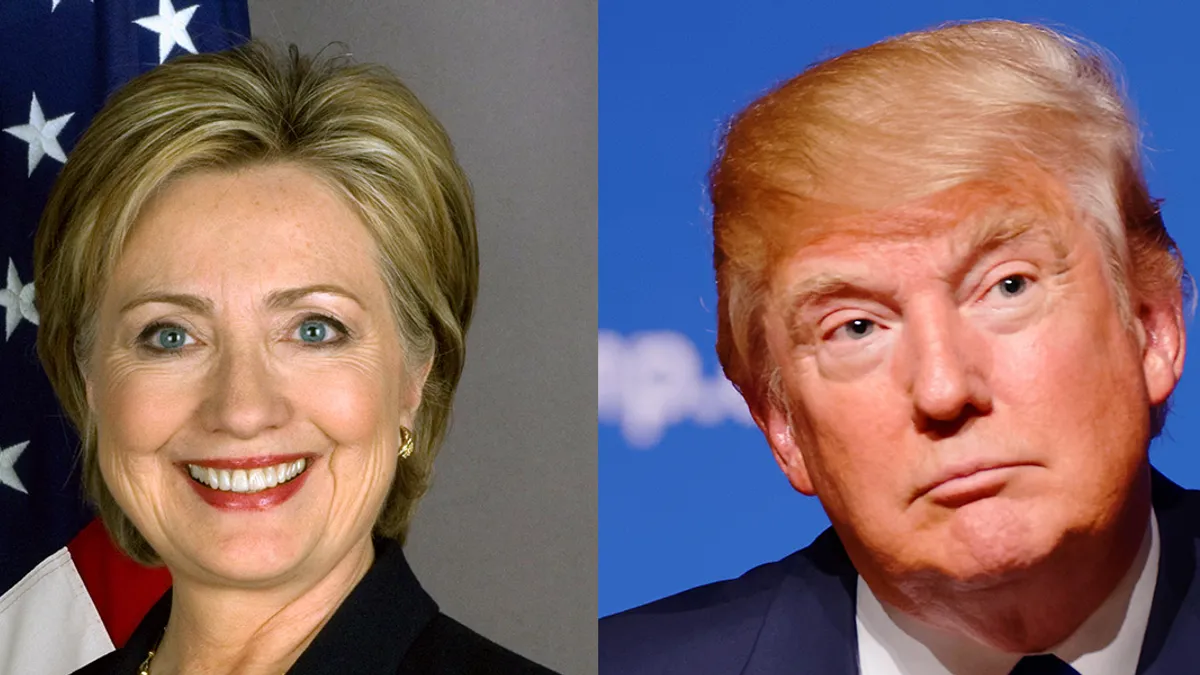Dive Brief:
- The first Presidential debate touched briefly on clean energy policy with Donald Trump appearing to reference the U.S. Department of Energy's support of Solyndra, a solar developer which lost more than $500 million for a federal loan guarantee program.
- Solyndra was formed more than a decade ago and went bankrupt in 2011. The DOE loan guarantee program at the heart of the controversy has since begun turning a profit for taxpayers.
- For Clinton's part, she mentioned installing 500 million more solar panels, building a new electric grid and the impact clean energy support can have on jobs and the economy.
Dive Insight:
If you were looking for in-depth analysis of energy issues, last night's Presidential debate came up a bit short. But the topic was raised surprisingly fast, in an exchange that seemed to sum up the rest of the debate in some ways.
The Washington Post and NPR have transcripts here and here. It started when Hillary Clinton said "Donald thinks that climate change is a hoax perpetrated by the Chinese," and largely ends with Trump appearing to make a veiled reference to Solyndra, the now-bankrupt solar developer that was supported by questionable DOE loans.
"We can deploy a half a billion more solar panels. We can have enough clean energy to power every home," Clinton said. "We can build a new modern electric grid. That's a lot of jobs; that's a lot of new economic activity."
"She talks about solar panels," replied Trump. "We invested in a solar company, our country. That was a disaster. They lost plenty of money on that one. ... Now, look, I'm a great believer in all forms of energy, but we're putting a lot of people out of work. Our energy policies are a disaster."
Trump's energy policies largely focus on loosening regulation of energy development, opening more offshore areas to production, and ending policies detrimental to the coal industry. Last week, he told a fossil fuel conference he would scrap President Obama's Clean Power Plan, which aims to curb greenhouse gas emissions 32% by 2030 from the power sector. If those energy restrictions are lifted, natural gas-fired generation could plummet 11% as coal again regains its dominance, according to a Bloomberg analysis.
On the other hand, Clinton's energy proposals include a focus on renewable energy, efficiency and lowering oil consumption.
The mention of Solyndra caught some by surprise. Katie Fehrenbacher at Fortune wrote that tying the company to failed energy policy is out of date.
"That Solyndra is still being brought up as an example of a failed energy policy is surprising. The company was founded in 2005, and went bankrupt six years later in 2011," Fehrenbacher writes. "Meanwhile, solar companies in the U.S. have been installing record numbers of solar energy in both large power plants and on building rooftops."
It plays differently in the Daytona Beach News Journal, where the reporters called Trump's reference a "blistering critique of Obama administration energy policy."
Environmental Defense Fund's Elgie Holstein issued a response to Trump's comments, saying the candidate's "understanding of energy policy is frighteningly shallow. Cancelling clean air rules and allowing irresponsible drilling on precious public lands would not make us more competitive. We are in a race for the clean energy jobs of the 21st Century and the plans Donald Trump has outlined would wave a white surrender flag to Europe and China.”
American Petroleum Institute President and CEO Jack Gerard issued a statement ahead of the debate, saying "whatever the outcome tonight, the American people have already cast their ballot for energy."
Gerard said 77% of voters support increased production of U.S. oil and natural gas and more than eight in 10 support increased infrastructure development, "which keeps affordable energy moving to homes and businesses, and could generate $1.14 trillion in capital investments and support as many as 1.15 million jobs."














